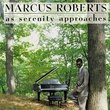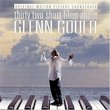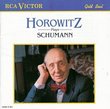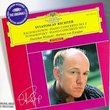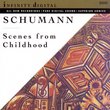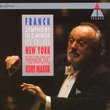| All Artists: J.S. Bach, Juilliard Quartet Title: Bach: Art of the Fugue Members Wishing: 0 Total Copies: 0 Label: Sony Original Release Date: 1/1/1992 Re-Release Date: 4/21/1992 Genre: Classical Styles: Forms & Genres, Improvisation, Historical Periods, Baroque (c.1600-1750), Modern, 20th, & 21st Century Number of Discs: 2 SwapaCD Credits: 2 UPC: 074644593723 |
Search - J.S. Bach, Juilliard Quartet :: Bach: Art of the Fugue
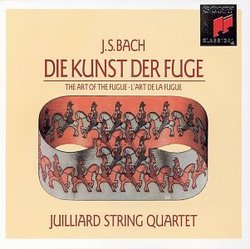 | J.S. Bach, Juilliard Quartet Bach: Art of the Fugue Genre: Classical
|
Larger Image |
CD DetailsSimilarly Requested CDs
|
CD ReviewsA wonderous recording of this complex fugue. Charlise Tiee | 01/11/2000 (5 out of 5 stars) "Bach's unfinished fugue is incredible. I have heard different recordings of it, but this one is by far the best. Since Bach did not notate what instruments are to play the parts, recordings can really vary as far what instruments they use, which in turn quite changes the sound of the piece. A string quartet is a lovely choice for this piece, and the Juilliard String Quartet does an excellent job. By the by, if you are partial to Cognitive Science, and liked , this recording may be of interest to you." Wow Michael Newman | Long Beach, CA USA | 01/18/2005 (5 out of 5 stars) "Bach's music presents the epitome of the craft of fugue-writing. Fugal forms permeate every part of Bach's writing -- from the most lyrical of the French Suites to the Brandenburg Concertos, to the Musical Offering and the Goldberg Variations, not to mention the Well-Tempered Clavier and the organ fugues. In many ways, all of Bach's work is an "art of fugue." But here we have Bach's genius distilled to its essence. No flowery melodies, no lyricism -- just the pure interaction of interlocking melodies; often dissonant, often disquieting, always incredible. While the Art of Fugue can be played on any arrangement of instruments (several very nice harpsichord and piano versions exist), the quartet arrangement of these pieces allows one to most clearly discern the various voices in these extraordinary fugues (and canons). The Juilliard Quartet provides remarkable performance of this landmark piece. Their style is spare and dry (though not as spare and dry as Emerson SQ's more recent recording). But real beauty bubbles up throughout these learned performances. The final fugue, which although unfinished is among Bach's longest, and which features the theme of Bach's name (Bb, A, C, and B), is played brilliantly and will be savored over again and again. If you have one recording of the Art of Fugue, this should be it." Juilliard Illuminates Bach's Art of Fugue Michael Newman | 12/13/2000 (5 out of 5 stars) "In this amazing recording of Bach's Art of Fugue, the Juilliard String Quartet truly defines itself as one of the 20th Century's leading string quartets. While the Fugues were not originally composed for string quartet, the Juilliardians make it sound as though it couldn't be performed any other way! From start to finish, this is a must for every Bach-lover's AND string-quartet-lover's library!"
|

 Track Listings (11) - Disc #1
Track Listings (11) - Disc #1
